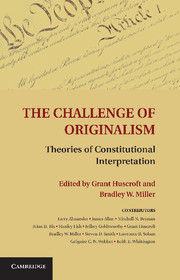Book contents
- Frontmatter
- Contents
- Preface
- Contributors
- The Challenge of Originalism: Theories of Constitutional Interpretation
- Part One Exposition and Defense
- Part Two Interpretation and Intention
- Part Three Originalism and Constitutional Settlement
- Part Four Challenges and Critiques
- 10 That Old-Time Originalism
- 11 Reflective Equilibrium and Constitutional Method: Lessons from John McCain and the Natural-Born Citizenship Clause
- 12 Constitutions, Originalism, and Meaning
- Index
- References
10 - That Old-Time Originalism
from Part Four - Challenges and Critiques
Published online by Cambridge University Press: 07 October 2011
- Frontmatter
- Contents
- Preface
- Contributors
- The Challenge of Originalism: Theories of Constitutional Interpretation
- Part One Exposition and Defense
- Part Two Interpretation and Intention
- Part Three Originalism and Constitutional Settlement
- Part Four Challenges and Critiques
- 10 That Old-Time Originalism
- 11 Reflective Equilibrium and Constitutional Method: Lessons from John McCain and the Natural-Born Citizenship Clause
- 12 Constitutions, Originalism, and Meaning
- Index
- References
Summary
Whether courts should interpret constitutional provisions according to their “original meaning” was a live and much-debated question a generation ago and, perhaps surprisingly, it is a live and much-debated question now. But current debates are not just well-worn reruns of the older ones. The conspicuous change is that the subject has become more theoretically sophisticated than it once was. Contemporary discussions increasingly exhibit the influence of philosophy in an analytical vein.
So, has that influence been beneficial? In this essay, I want to question whether it has been. And I want to attempt a modest and tentative defense of the old-fashioned originalism, not so much against its cultured despisers as against its cultured supporters.
- Type
- Chapter
- Information
- The Challenge of OriginalismTheories of Constitutional Interpretation, pp. 223 - 245Publisher: Cambridge University PressPrint publication year: 2011
References
- 1
- Cited by



